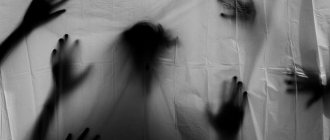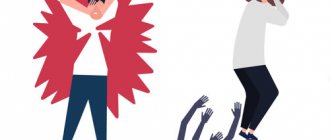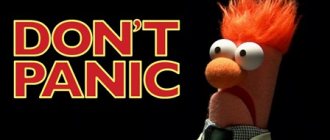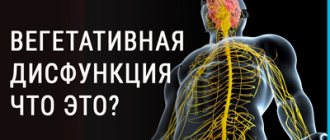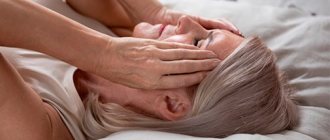What are panic attacks
Panic attacks are a very scary psychological disease in which uncontrollable panic attacks occur without any particular reason.
But many people who suffer from such disorders do not really understand that this panic can be controlled and treated. People often have a very difficult time when such disorders arise, but they do not turn to specialists who are ready to provide them with some help. There are quite a lot of reasons here. One of these reasons is the lack of special information about such a disease.
Many people think that panic attacks cannot be cured or, on the contrary, are afraid that treatment by a psychiatrist will negatively affect their social status. Some try to get rid of this disease at home. But few people know the true nature of panic attacks.
Causes and factors in the formation of a panic attack
Such attacks appear as a result of vegetative-vascular dystonia. Or similar attacks can occur after stressful situations that have happened to a person.
A panic attack can be triggered by taking certain medications or stimulants, ranging from caffeine to strong central nervous system stimulants. And finally, panic disorder may be one of the manifestations of depression.
Frequent consequences of a hangover
The main link connecting panic attacks and alcohol is hangover. A hangover is a serious poisoning of the body with one of the breakdown products of alcohol, called acetaldehyde. When drinking alcohol-containing drinks in large doses, the liver simply cannot cope with processing the incoming poison, resulting in its gradual accumulation. An important feature of acetaldehyde is its extremely negative effect not only on internal organs, but also on the entire human nervous system, including the psyche and brain.
Therefore, there is nothing surprising in the extensive list of negative consequences of a hangover, which include:
- frequent urination;
- fever , turning into chills or heat and accompanied by profuse sweating;
- nausea and constant vomiting;
- pressure changes, tachycardia;
- pain in the heart and other organs;
- numbness of the limbs to the point of convulsions;
- trouble sleeping at night and daytime sleepiness;
- general lethargy and poor health;
- migraines and dizziness , the frequent result of which is fainting.
The impressive list of physical ailments given above is supplemented by no less serious mental disorders. Among them:
- already mentioned panic attacks;
- causeless anxiety, turning into increased anxiety and fear;
- hallucinations;
- thoughts of suicide or self-harm;
- feelings of constant persecution, which often transform into real mania;
- inability to focus and concentrate;
- a feeling of guilt, often without any clear and conscious reason.
Panic attacks caused by alcohol are rightly recognized by experts as one of the most severe consequences of a hangover. The level of their negative impact on the human body exceeds the damage from other, also extremely unpleasant, ailments listed in the list. Therefore, it is advisable to consider the nature and symptoms of this negative phenomenon in more detail.
What does a seizure look like?
A panic attack is a rather sharp attack of fear, which can be characterized by completely different symptoms until the deterioration of well-being. Attacks occur very unexpectedly, and under the most normal conditions for a person. That is, in order for a panic attack to occur, there is no need to go to any special place. This situation can make a person’s condition much worse, and the person often begins to feel as if he is defenseless against any attack. During such an attack, a person may begin to choke, experience sudden movements, and be nervous. He constantly worries that this attack will return to him again.
How does alcohol affect the nervous system?
Doctors attribute the appearance of symptoms of mental illness to the production of norepinephrine and adrenaline. Another factor in the development of the anomaly is problems with the metabolism of biologically active substances. Neurotransmitters are necessary for the normal functioning of the central nervous system.
Regular attacks indicate that the patient has a serious illness. Alcohol in this case only provokes an exacerbation of the pathological process, affecting the functioning of the nervous system. After drinking alcohol, there is a powerful release of adrenaline.
This effect causes vasospasm, a surge in pressure and arrhythmia. A large amount of oxygen negatively affects a person’s psycho-emotional state. Excess causes feelings of fear and anxiety.
How to quickly eliminate an attack
The following rules will help you cope with this attack:
Correct breathing and its normalization
When a person feels fear, his breathing becomes faster and more oxygen enters the blood. The gas balance becomes disturbed, which can lead to hyperventilation.
The person feels like he doesn't have enough air. But during panic attacks, on the contrary, the oxygen content increases by about 40%. Here the main task will be to make the oxygen supply much smaller. In this case, the person needs to use the bag to breathe into it. Thus, reducing the flow of air into the body. It is worth breathing into it until the person’s condition returns to normal. But if it so happens that the package is not nearby, then you can simply press your palm tightly to your mouth and nose and breathe while doing so.
Businessman holding paper bag over mouth as if having a panic attack
Activating your senses will also help.
When we give the brain certain information from different organs of perception. There is a way to switch the brain to process this signal so that the fear disappears on its own.
In this case, a much simpler option would be to use the sense of touch. For example, if you feel panic overtaking you again, just pinch yourself. You can also wear an elastic band on your arm. And in the event that PA overwhelms you again, pull back this rubber band to get a click and a sign that the brain needs to switch from this fear to something more pleasant. Washing with cold water can also help in this situation.
It is important to control your movements
During experiences, a person may experience repetitive movements that he makes completely unconsciously, and may even experience numbness. This reaction will definitely not allow the patient to get out of this state.
It is important to return control to the body. To do this, it is necessary to focus your attention on the muscles of the legs and arms, and also gradually make your movements smooth.
Another way is to try to switch your attention from the internal to the external environment.
Often experiencing panic attacks, a person can withdraw within himself, and then various symptoms begin to appear. The fear begins to become stronger. But if the brain can focus on something outside, then it will become much easier for the patient. For example, start counting cars on the street or people passing by. There can really be a lot of ways. You can also call a friend or even chat with a stranger.
What is useful to know about alcoholism and binge drinking?
Alcoholism at the national level is perceived as a direct threat to the social system, economy, spiritual and scientific development. Russia currently ranks 4th in the world in terms of the amount of alcohol consumed per capita. Over the course of a year, a Russian drinks up to 25 liters of alcohol in the form of legalized alcoholic beverages.
Alcoholism is especially noticeable among young people and middle-aged men. According to statistics, the usual number of deaths per year due to alcohol is 300,000 people. 15,000 people die due to poisoning from low-grade alcoholic drinks. But the statistical data is very contradictory; there is reason to assume more serious figures.
The dangers of alcohol addiction are:
- in devastating effects on physiological health;
- in the destruction of the mental state;
- in violation of social values;
- in personality degradation;
- in decreased ability to work;
- in danger to society and the family of the alcoholic.
But the most terrible thing, according to researchers, is the fact that alcohol addiction provokes:
- delinquent;
- deviant behavior.
About 80% of all offenses occur in Russia while intoxicated. A few ugly facts.
- 80% of murderers were drunk at the time of taking the life of another person.
- A person who is intoxicated is at greater risk of dying from the actions of another person than others.
- In alcoholics, this risk is 8 times higher than in healthy people.
- 30% of crimes under the Criminal Code of the Russian Federation are committed as a result of alcohol intoxication and a corresponding change in consciousness.
- 30,000+ people die on the roads every year due to a drunk driver.
- Most people become chronic alcoholics at the age of 20-22 years.
- People die from alcoholic consequences mainly at the age of 40-45 years.
- Alcoholization contributes to a reduction in an individual's life expectancy by 9-22 years.
Help from a psychotherapist during attacks
To eliminate such panic attacks, psychotherapy is divided into:
- Directive - one that really requires the presence of a leader or simply a guide.
- Psychotherapy can also be non-directive - which is used when working with educated people.
In psychotherapy, specialists begin to analyze in detail the situation of anxiety. They also help to sort out all situations so that the patient can cope with them independently. He just has to show that he can get rid of any panic attack. Everything is in his hands.
And also in the process of all psychotherapy, it is quite important that there is interpersonal contact between the patient and the doctor.
Hangover anxiety. How to get rid
Since anxiety, like fear, are characteristic signs of poisoning, they should be dealt with by means of detoxifying the body.
Replenishing the lack of water and minerals
Severe diuresis and impaired salt balance are a consequence of poisoning . Therefore, if you have a hangover, you need to drink more fluids. Suitable:
- fruit drink,
- herbal decoctions or infusions,
- green or black tea,
- ayran or tan or other fermented milk drinks.
Treating like with like and eliminating a hangover by drinking alcohol is strictly contraindicated.
Taking vitamin and mineral complexes will help. Vitamins C and group B will help well, as they speed up metabolism and tissue regeneration and the removal of toxins. If necessary, you should try to administer thiamine intramuscularly. Aspirin or Alko-Seltzer will help you cope with a hangover.
During treatment, you should always remember about contraindications and chronic diseases. A contrast shower helps eliminate anxiety and restlessness. If a person has diseases of the cardiovascular system, then a contrast shower will have to be abandoned.
When answering the question of how to relieve anxiety from a hangover, do not forget about folk remedies. They also help improve the condition and eliminate poisoning.
Over time, the body will cope with the poisoning itself. He needs help with this. For example, through a balanced diet. Vegetable soup or chicken broth works well.
Taking medications
Of course, we have already mentioned that panic attacks can also be treated with various medications.
This type of treatment often requires that the patient begins treatment only on the recommendation of a doctor. And nothing else.
Drugs that help relieve a patient from panic attacks can be divided into 5 general groups:
- Sedatives;
- Anxiolytics;
- Antidepressants;
- Neuroleptic drugs;
- Nootropics.
Breathing exercises during an attack
You can get rid of a panic attack using diaphragmatic breathing.
This exercise is performed according to the following algorithm:
You need to relax thoroughly and start breathing through the diaphragm. To do this, you need to place your hand on your stomach in order to fully begin to control the entire process. It is worth inhaling air for 3-4 counts, and holding it for approximately 2 counts. And you need to exhale air in approximately 6 counts, and rather slowly.
It is also necessary to focus on relaxing the body, while it is important to leave all thoughts alone. It is also important to repeat this pace for 10-15 minutes.
This exercise can be performed in addition to home, also on the street, in a store or in any other place.
Application of auto-training
In a short time you can get rid of panic attacks using auto-training. Auto-training will help the patient feel safe; it will also be possible to convince him that nothing is happening around him and there is no reason to worry.
Autotraining operates on the principle of hypnosis, helping a person to suggest what he needs to understand. So, thanks to auto-training, you can get a positive result from this procedure and, finally, get rid of harmful panic attacks.
Can you drink alcohol during panic attacks?
Of course, alcohol can help get rid of the fear of a panic attack, but it can only drown out this fear for a while, and will not completely get rid of this problem. Therefore, in this case, it is better not to get used to drinking alcohol at all, because you can easily turn from getting rid of panic attacks to alcoholism. So, trying to get rid of panic attacks, a person will suffer from drinking alcohol. Therefore, it is advisable to treat attacks without drinking alcohol. After all, this is only a delusion or a muffling of fear, but not a complete deliverance from it.
Short-term memory loss
Taking large doses of alcohol can impair clarity of consciousness and a person may experience memory loss. Short-term amnesia after sobering up causes anxiety or fear in some people. Some experience anxiety until, on their own or with the help of drinking buddies, they reconstruct the series of events that happened the day before.
Some people, under the influence of alcohol, begin to behave strangely. They become completely inadequate. But some people can't remember this. After the alcoholic intoxication wears off, they are horrified by the realization that a series of ridiculous incidents are their doing. In addition, a person begins to be tormented by shame in front of loved ones for his actions and regret that nothing can be corrected now.
